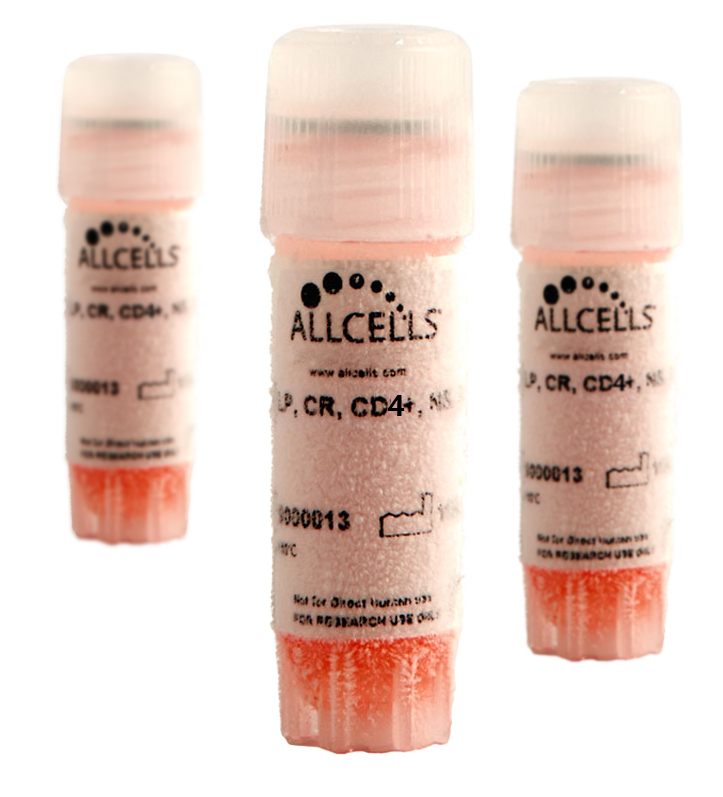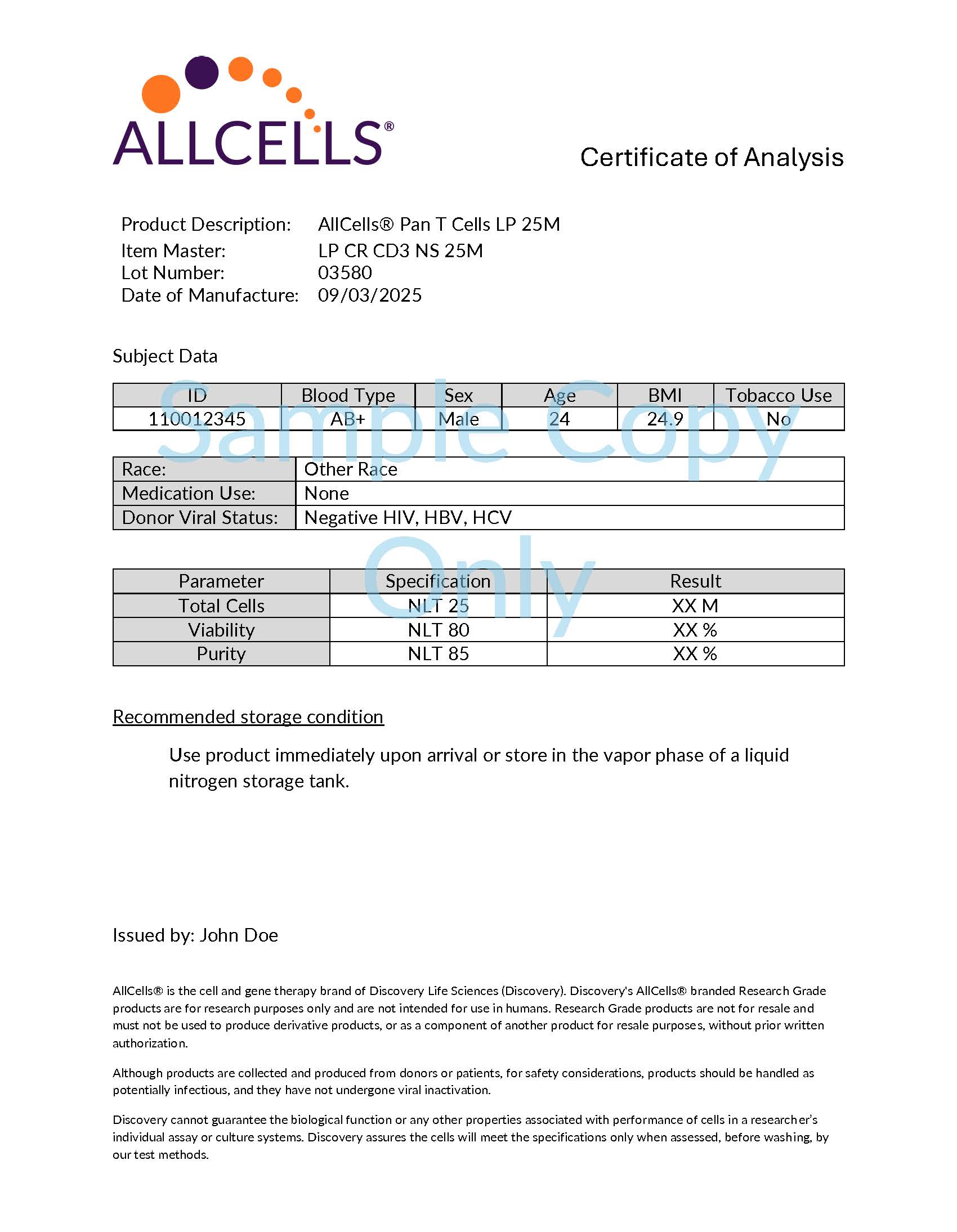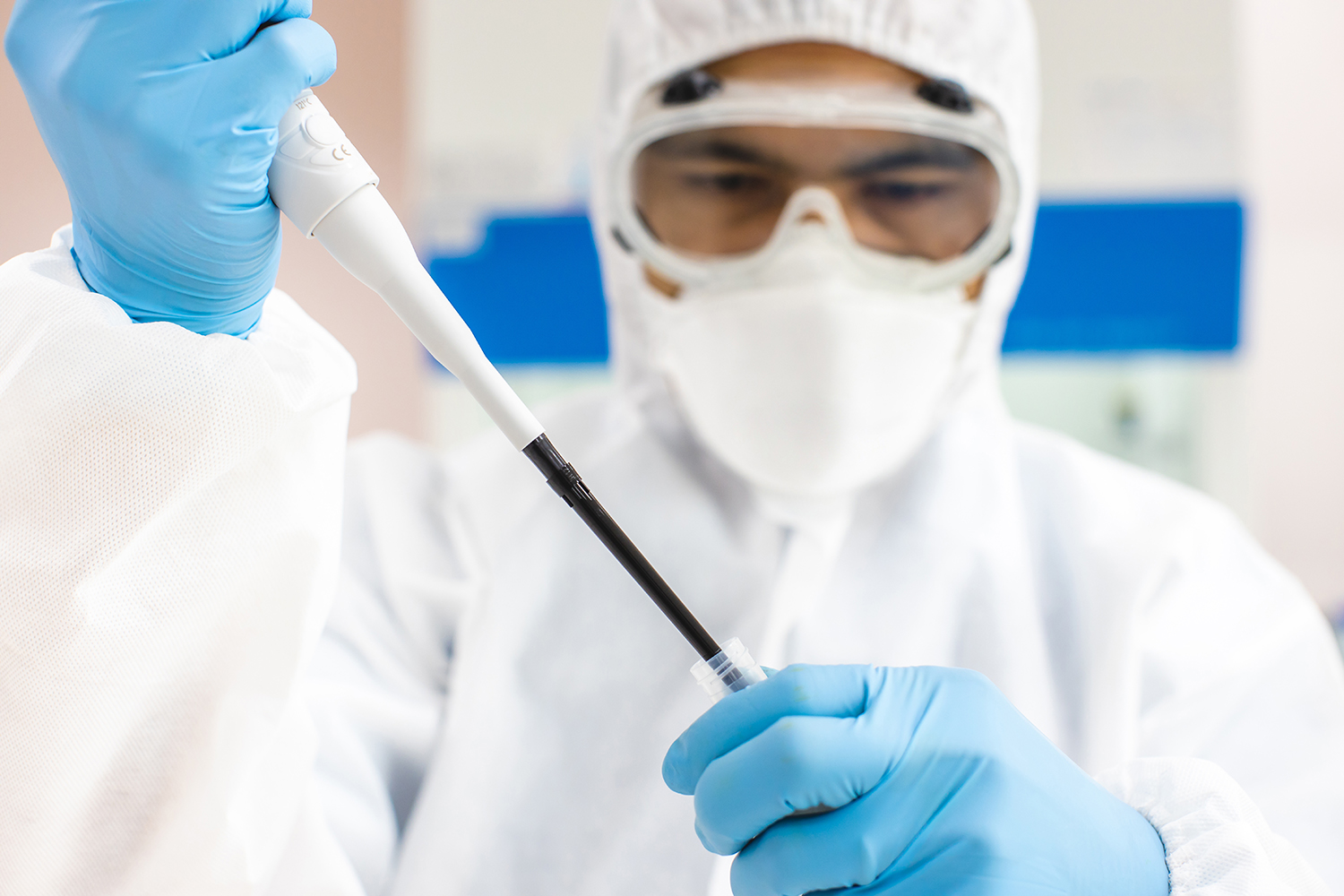
AllCells® T Cells
T cells are the main effector cells of the adaptive immune system and play a critical role in protecting the body against infection, cancer and other diseases. AllCells® T Cells delivers a solution for a diverse range of research programs such as CAR-T immunotherapies, cell and gene therapies, drug discovery, vaccine development and more.
Tissue source: Leukopaks
T Cell Formats, Attributes, and Unit Sizes
Discovery offers fresh and cryopreserved T cells derived from Leukopaks in a variety of types and sizes. Both negative and positive selection methods are available. The product chart below provides detailed information with standard formats and unit sizes. Don’t see what you’re looking for? All immune cell subsets can also be Made-to-order (MTO) with custom specifications to meet the specific requirements of your research project.
| Product | Cryopreserved |
|---|---|
| CD3+ Pan T | 25M |
| CD4+ Helper T | 25M |
| CD4+/CD45RA+ Naive Helper T | 5M |
| CD4+/CD45RO+ Memory T | 5M |
| CD8+ Cytotoxic T | 10M |
| CD8+/CD45RA+ Naive Cytotoxic | 5M |
| CD8+/CD45RO+ Memory T | 5M |
| RegT(CD4+CD127lowCD25+), PSNS | 1M |
| Gamma Delta T Cells | 2M |
*Bulk isolation services are available from fresh and cryopreserved starting material of full and half leukopaks.
For more information, please visit our MTO page or reach out to our Customer Success Team.
T Cell Types
CD3+ Pan T Cells
The CD3+ antigen is present on T cells throughout all stages of development, making it a useful immunohistochemical marker for all T cells. CD3+ T cells are typically a mixture of CD4+ and CD8+ T cell subtypes with a smaller portion of gamma/delta T cells. Immunotherapy strategies using T cells include tumor-infiltrating lymphocytes (TIL) therapy, engineered T cell receptor (TCR-T) cell therapy, and CAR-T cell therapy.
CD4+ Helper T Cell
Activated CD4+ Helper T (Th) cells play key roles in tumor immunity by assisting other lymphocytes, including maturation of B cells into plasma cells and memory B cells, and activation of cytotoxic T cells and macrophages. There are a number of distinct subsets of CD4+ T cells with distinct functions. These polyfunctional cells are frequently used in cancer immunotherapy research specifically to study the role of checkpoint inhibition in anti-tumor T cell responses.
CD4+/CD45RA+ Naive T Cells
Circulating CD4+/CD45RA+ Helper T cells have not been exposed to antigen. They become activated after interaction with the antigen-MHCII complex on antigen-presenting cells and differentiate into CD4+/CD45RO+ memory helper T cells, effector CD4+ T cells (Th1, Th2, Th17), and regulatory T cells (Treg) based on the specific cytokines present. They are used to study molecular mechanisms driving CD4+ cell differentiation to specialized subtypes as well as antigen-specific activation processes or as a source of cells to differentiate into subtypes for further study.
CD4+/CD45RO+ Memory T Cells
CD4+/CD45RO+ memory helper T cells are antigen-specific T cells that remain long-term after infection or vaccination. The memory T cells are quickly converted into large numbers of effector T cells upon re-exposure to that antigen, able to generate a rapid and potent response to past infection. They are an important subset for vaccine development and are also used to study antigen-specific responses, checkpoint inhibition, T cell proliferation, and cancer immunotherapy.
CD8+ Cytotoxic T Cell
CD8+ cytotoxic effector T cells are the most abundant T cells in peripheral blood and are important in eliminating viruses and tumor cells through the targeted release of cytolytic enzymes. These potent effector cells are the focus of adoptive cell therapies like CAR-T, which look to boost their specificity and cytotoxicity towards tumor cells.
CD8+/CD45RA+ Naive Cytotoxic T Cells
Naive CD8+ T cells circulate in the peripheral blood until they come into contact with foreign antigen recognized by their TCR in the context of MHCI complexes on antigen-presenting cells. The naive T cells differentiate into memory CD8+/CD45RO+ cells (retains memory of this specific antigen/pathogen in case of repeat challenges) and antigen-specific cytotoxic effector CD8+ T cells.
Regulatory T Cells
CD4+/CD127low/CD25+ regulatory T cells (Treg) are a sub-population of CD4+ T cells that modulate the immune system, maintain tolerance to self-antigens, and prevent autoimmune disease. They regulate and suppress the activation, proliferation, and cytokine production of CD4+ and CD8+ T cells to prevent inappropriate self-reactivity. Within the tumor microenvironment, Tregs can be used to study the mechanism of action for cancer immunotherapies. New adoptive cell therapy strategies like CAR-Treg are being developed to treat graft rejection (i.e., GVHD) in solid organ transplantation and autoimmune diseases.
Gamma-Delta (γδ) T Cells
Gamma-delta (γδ) T Cells are versatile immune effectors of immunotherapy research capable of directly targeting tumor cells, recognizing stress-induced signals, and modulating the immune response.
Tissue Source
Leukopaks
Isolated Cell
T cells isolated from Leukopaks are available through positive or negative immunomagnetic bead separation. Positive immunomagnetic bead separation – beads bind to the target cell population from the heterogenous mixture; labeled target cells remain while the non-target cells are removed. Negative immunomagnetic bead separation – beads bind to the non-target cell population to deplete them from the mixture leaving behind the unlabeled cells of interest.
Research & Development Applications
- Fundamental Research (Proliferation, Biomarker Discovery)
- CAR-T Cell Therapy
- Drug Discovery
- Immuno-oncology
- Cell Therapy process development

At Discovery, we believe that your success is our success. We believe that sharing our knowledge and expertise is more than a business practice, it’s a responsibility. And we believe that collaboration leads to better outcomes. Below is a collection of relevant links to T Cell resouces including blog posts, webinars and useful protocols to help you become more efficient and more effective.
WEBINARS
BLOG POSTS
- FAQ Blog Series: What’s the Difference between Positive and Negative Immunomagnetic Cell Separation?
- Overcoming the Global Biomaterial Supply Chain Challenge for the Development of CAR-T Therapies
- A Decade of Innovation: CAR-T Successes and Latest Developments
- T Lymphocytes: A Look at their Role and Research Applications
- Chimeric Antigen Receptor (CAR) T-Cell Therapy
- Engineered T-Cells: A look at Autologous and Allogeneic CAR-T Cell Immunotherapies
Have technical questions about T Cell products? Our Customer Success Team is standing by.
AllCells® Bulk Cell Isolation
Discovery’s AllCells® Bulk Cell Isolation Services cover a wide range of cell types from single-donor leukapheresis and bone marrow material. Obtain large quantities of quality-controlled cells including CD34+ HSPCs, lymphocyte populations (T cells, B cells, NK cells, and monocytes), and PBMCs for a variety of research and biomedical applications. Contact us for specific donor requests and custom isolation protocols.
Obtaining bulk quantities of highly pure and viable isolated cells from a qualified vendor offers researchers the opportunity to bank cells to support experimental consistency and comparability, and streamlines laboratory workflows.

